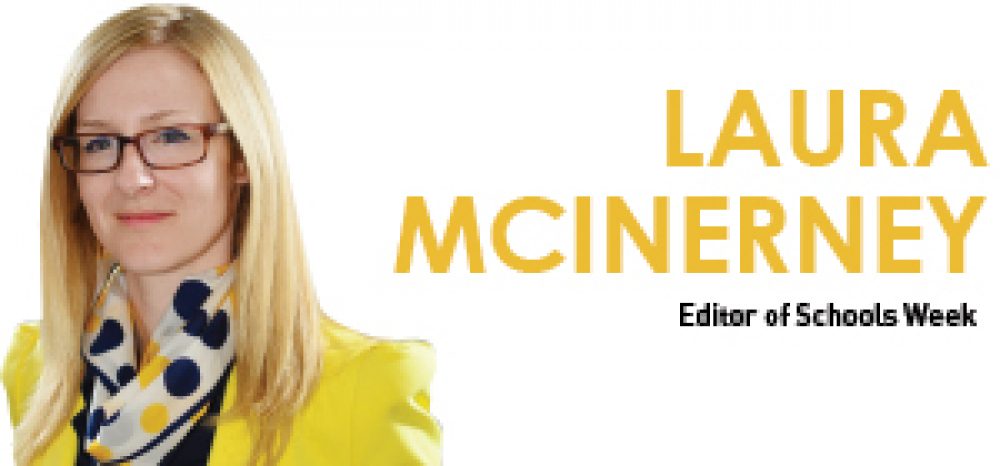At a certain point last night I grabbed our election supplement and flipped nervously to the Conservative education pledge list.
It was the first time I’d considered a party might need to deliver their list in full.
So, what can we expect from a fully Conservative department?
The Ministers
David Cameron said before the election that he wanted to keep Nicky Morgan as Secretary of State. But in a fully-Tory post-election world he might now change his mind.
There is a lot of chat about Michael Gove’s return but, notably, not among any people who know him. In all cases when I’ve asked they’ve shook heads and said ‘no’. (Or texted something along the lines of “pretty unlikely”).
If Morgan stays she’s likely to be supported by people already in the department. Edward Timpson has been strong on special needs reform. Nick Gibb’s focus on ‘core knowledge’ plays well with backbenchers.
Charlotte Leslie could also be a new face. She held her marginal seat in Bristol and having been instrumental in the Royal College of Teaching’s creation could take up space made by Laws’ exit. Liz Truss was also well liked by backbenchers in the role and there has been talk of her as a future Education Secretary.
An unknown quantity is Academies Minister Lord Nash. Rumours before the election were that he was planning to stand down but perhaps he could now be convinced to stay.
The Policies
Budgets – The Conservatives have pledged to maintain per pupil funding for 5 – 16 year old school pupils – even as their numbers rise. Early years and 16-19 education are not protected under this. The settlement isn’t going to be generous in the face of inflating prices for schools, but it wasn’t going to be, whoever got in.
Academisation & Free Schools – It will be harder and faster. Cameron has pledged 500 more free schools. Morgan and Cameron both made speeches pledging to force schools that receive a ‘requires improvement’ from Ofsted to become academies. There are no plans to change the Regional School Commissioner mechanisms, nor to make the free school or academy sponsor process more transparent.
For-Profit Schools – The Conservatives explicitly ruled this out in their manifesto. It would be daft of them to go back on it. Daft. But not impossible.
Curriculum – Compulsory EBacc for all; SAT resits for 11 year olds who don’t receive a level 4 at primary school; continued fragmentation of levels. It’s sort of like Gove, but on speed.
Grammar schools – The manifesto re-confirmed the Conservative commitment to allow ALL good schools to expand – including grammar schools. Nicky Morgan has continually delayed this decision. She will now have to make it. My money is on her saying ‘yes’ given that the Liberals aren’t around to kick up a fuss.
Teachers – Beside promises to train extra maths and science teachers there’s really not much on teaching. Encourage TeachFirst (yawn), and a Royal College of Teaching (yawn), reduce paperwork (good luck with that), and train teachers in how to stop low-level behaviour (if there was a magic formula for that we’d all know it by now).
Careers – In the last few months Morgan slung some cash into a company that will broker careers advice in schools. That will carry on.
Vocational education – More University Technical Colleges and more apprenticeships. Unfortunately, many UTCs are empty and losing cash, and apprenticeships aren’t a thing you can just “create”.
And that’s sort of it.
I’m not sure whether the framework being so flimsy is positive, or whether it’s terrifying.
What I am sure of is that these pledges – when looked at in the cold light of a single-party government – don’t add up to much. There’s no coherent plan and no real answers to the major problems facing schools: teacher shortages, impending curriculum nightmares, vulnerable learners increasingly affected by poverty.
The next few years are going to be as interesting as they always are in education. Are they going to be a nightmare? I get the sinking feeling they might be.







I don’t know enough to fully comment but I really hope Nicky Morgan stands by her statement that she will readdress the #summerborn Issue and really make it easier for parents to decide when their summer born children start school!
It’s likely for-profit schools will appear under the radar. In 2010, Michael Gove said he would let groups like Serco run schools. He was at the launch of the Policy Exchange document ‘Blocking the Best’. This advocated running schools for profit. It admitted that schools deemed ‘independent’ could outsource their operations to a for-profit provider already without any change in the law. Academies are, of course, ‘independent’. For-profit firm, IES, already runs one free school, IES Breckland, although that was deemed Inadadequate. Kunskapskollan runs four academies through its charitable arm, the Learning Schools Trust. It’s likely that many for-profit education providers will set up charitable vehicles to front their operations in England. Some like GEMS have done so already.
I’m interested that the author has responded with yawns about the nascent College of Teaching. Certainly within the profession, the majority of teachers seem very enthusiastic about bringing it into existence. My concern is that it will lack the teeth to effectively challenge the government policies keeping the profession down. For example, will potential members value chartered status – commonly offered by the colleges of other professions – if state schools are prevented from paying higher salaries to chartered teachers?